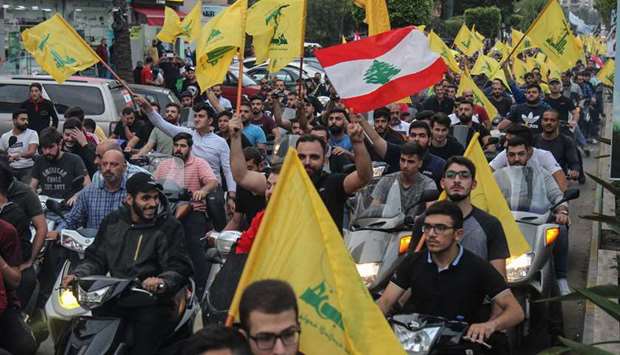Tensions rattled Lebanon’s nine-day protest movement yesterday, with a powerful leader seeking to diffuse them by calling his supporters away from the streets.
The demonstrators — who have thronged towns and cities across Lebanon — have been demanding the removal of the entire political class, accusing many across different parties of systematic corruption.
The chief of powerful movement Hezbollah, Hassan Nasrallah,yesterday warned that any cabinet resignation would lead to “chaos and collapse” of the economy.
“We do not support the resignation of the government,” he said in a televised speech, Lebanon’s national flag — instead of his party’s colours — positioned behind him.
Hezbollah is a major political player in Lebanon and with its allies holds the majority in the cabinet.
Nasrallah also called on his partisans to leave the streets after scuffles broke out in Beirut between them and other anti-graft protesters.
Unprecedented protests have erupted in some Hezbollah strongholds, but a number of its supporters have also taken offence to slogans against their leader.
In the capital’s main square, protesters fell silent to listen to Nasrallah’s speech broadcast on loudspeakers.
As it neared its end, the police moved in to separate Hezbollah supporters from the rest of the demonstrators, an AFP correspondent said. Before they retreated, Hezbollah backers threw rocks, plastics bottles and branches at the other demonstrators, who responded in kind chanting “Revolution”.
After night fell in the northern city of Tripoli, hundreds held up their mobile phones with their lights on, waving them as if at a concert.
Among them, 33-year-old engineer Bilal Hussein said he was not surprised Nasrallah wanted the current cabinet to stay put.
“We realise that Nasrallah is the one controlling Lebanon,” he said
The Hezbollah, is the only movement not to have disarmed after Lebanon’s 15-year civil war. After initially welcoming the protests as spontaneous, Nasrallah yesterday insinuated that the protesters were being manipulated.
Numbers have declined since Sunday, when hundreds of thousands took over Beirut and other cities in the largest demonstrations in years, but could grow again over the weekend.
Lebanon’s largely sectarian political parties have been wrong-footed by the cross-communal nature of the largely peaceful protests.
Waving Lebanese flags rather than the partisan colours normally paraded at demonstrations, protesters have been demanding the resignation of all of Lebanon’s political leaders.

Supporters of the Hezbollah movement drive in a convoy in support of its leader Hassan Nasrallah’s speech, in the southern suburbs of Beirut, yesterday.
